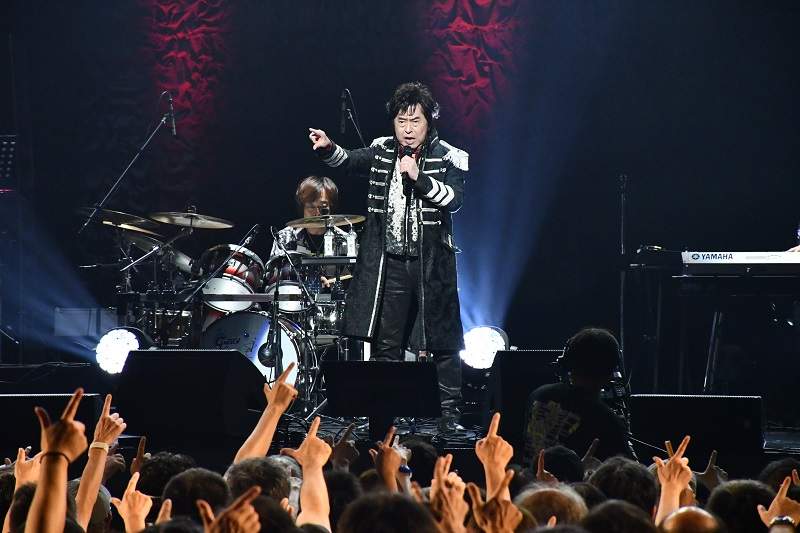- Manga & Anime
- MY HEROES
Ichiro Mizuki shines on stage in show of fighting spirit

Ichiro Mizuki sings to an enthusiastic crowd during “Anime Japan Fes 2022 Super Anison Spirits — The Legend —” on Aug. 14.
12:00 JST, September 9, 2022
I went to a concert featuring Ichiro Mizuki for the first time in about 2½ years. It was at the anison (anime song) concert titled “Anime Japan Fes 2022 Super Anison Spirits — The Legend —” on Aug. 14.
During the long span when many concerts were canceled due to the novel coronavirus pandemic, a storm of lethal proportions was raging around the singer, affectionately called Aniki (Big bro) by fans. In spring last year, he announced that he had symptoms of vocal cord dysfunction. And in July this year, he revealed that the examinations he underwent because of the symptoms led to the detection of lung cancer that had already spread to his lymph nodes and brain. Having received treatment, he was diagnosed with lung cancer yet again this year and had an operation in June. He has not stopped singing though, even though he now regularly visits the hospital and is undergoing rehabilitation with a speech therapist and a physiotherapist.
I went to the concert because I wanted to hear Mizuki sing his songs, and as someone who has grown up singing along to his voice, I wanted nothing more than to cheer him up.
The concert started with a duet between him and Mitsuko Horie of “Tatakae! Ga-Keen!” the theme song from the anime show “Ga-Keen, the Magnetic Robot.” He also sang the theme song from “Mazinger Z,” arguably his signature piece, and songs from “Tiger Mask 2” and “Tekkaman, the Space Knight.” He also performed “Seishun Fever (Combat March),” a song from “Dokaben,” with Horie and Isao Sasaki and the title song from “Babil 2” with Horie and Hironobu Kageyama.
Mizuki’s singing may not be exactly the same as before. Yet how strong was the message he delivered to the audience? Don’t fold, never give up, stand up and fight — such lyrics in an anison go straight to one’s heart when he sings them. The fact that Mizuki is himself “fighting” right now added to the potency of the songs, so that they sounded more formidable than usual.
Before the curtain went up, I visited him in the dressing room to say hello. He was as high-spirited as ever and told me, “I’ll do the best I can to bare my soul.” He remained true to his word. I think what we received that day was the very soul of his songs, Mizuki’s very feelings.
At the same time, I was also touched by how his fellow singers, such as Horie, subtly supported him on stage. Yes, the heroes and heroines in these songs helped each other to face their troubles. The performers on stage embodied the lyrics.
“Being on stage, singing on stage makes me the happiest,” Mizuki said during the finale.
The audience, still barred from speaking or singing in the venue, responded to him with thunderous applause.
Turning my eyes to the outside world, I see no end in sight for the fight against COVID-19, and in Ukraine, the strong are trampling the weak. Japan’s economy has stalled out — gone are the days when the book “Japan as No. 1” was a bestseller. Sometimes I feel that the world’s future is shrouded by strange clouds of uncertainty.
In a time like this, I was immensely encouraged by Mizuki continuing to sing on stage. And I had a thought. In the world we live in, there have always been anison that have encouraged us and cheered us up. And Ichiro Mizuki has always been there as if he were an embodiment of anison. That’s why we can raise our heads high, refuse to give in and press onward.
On Nov. 27, Mizuki will be joined by Horie for the concert “Futari no Anison” at Yomiuri Otemachi Hall in Chiyoda Ward, Tokyo.



